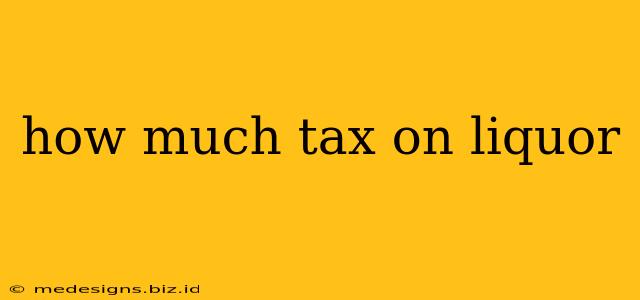Navigating the world of alcohol taxes can be confusing. The amount of tax you pay on liquor varies significantly depending on several factors. This guide breaks down the complexities, helping you understand exactly what influences the final price you pay.
Factors Affecting Liquor Taxes
Several key elements determine the tax burden on your favorite spirits:
1. Location, Location, Location:
This is the most significant factor. Tax rates differ drastically between states, provinces, and even countries. Some jurisdictions impose high taxes to curb alcohol consumption, while others have lower rates. For example, a bottle of whiskey might be considerably more expensive in one state due to higher excise taxes compared to a neighboring state. Always check your local regulations for the most accurate information.
2. Type of Liquor:
Taxes often vary depending on the type of alcohol. Generally, spirits (like whiskey, vodka, and gin) are taxed at a higher rate than wine or beer. This is due to a combination of factors including perceived health impacts and production costs.
3. Alcohol Content (ABV):
The higher the alcohol by volume (ABV), the higher the tax. This is a common element across many jurisdictions. A bottle of 80-proof vodka will typically be taxed more than a bottle of 40-proof liqueur.
4. Volume:
Taxes are usually calculated per unit of volume (e.g., per gallon or liter). Therefore, a larger bottle will naturally incur a higher tax than a smaller bottle, even if the ABV is the same.
Understanding the Different Types of Liquor Taxes
Liquor taxes typically consist of two main components:
1. Excise Taxes:
These are taxes levied on the production or sale of alcohol. They are a significant portion of the final price and contribute substantially to government revenue. Excise taxes are often set at a per-gallon or per-liter rate.
2. Sales Taxes:
These are additional taxes added to the total cost of the purchase, including the excise tax. Sales tax rates vary depending on the location and are usually a percentage of the entire price.
How to Find the Specific Tax Rates in Your Area
To determine the precise tax on liquor in your area, you should consult your state's or province's alcohol beverage control agency or revenue department website. These websites typically provide detailed information on excise tax rates, sales tax rates, and any additional fees that might apply. Searching "[Your State/Province] liquor taxes" online will usually lead you to the appropriate resource.
The Bottom Line: Understanding Your Liquor Costs
The cost of your next bottle of liquor is significantly impacted by taxes. By understanding the factors at play—location, type of liquor, alcohol content, and volume—as well as the difference between excise and sales taxes, you can better appreciate the final price tag. Remember to always check the specific tax rates in your location for accurate pricing information.
